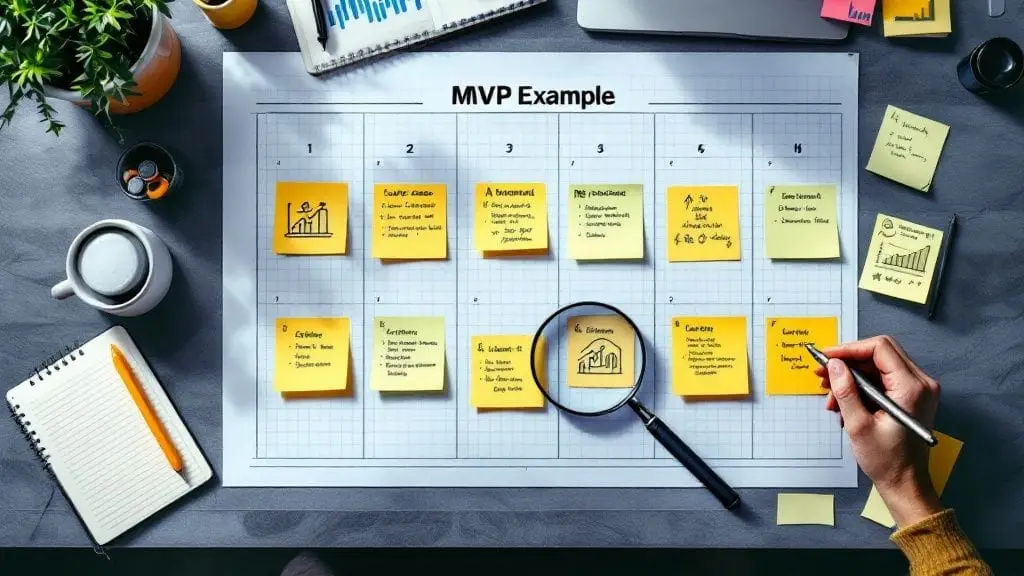The journey from a groundbreaking idea to a market-ready product is often long and expensive. Yet, some of the most successful companies today, from Airbnb to Zappos, started with a surprisingly simple approach: the Minimum Viable Product (MVP). An MVP isn’t just a stripped-down version of your final product; it’s a strategic tool designed to test your core assumptions with real users and gather invaluable feedback, all while minimizing risk and resource expenditure.
This guide dives deep into powerful minimum viable product examples, dissecting the “why” behind their success. We’ll explore their initial feature sets, the problems they aimed to solve, and the critical lessons learned along the way. Each case study includes detailed analysis, screenshots, and direct links, providing a clear blueprint for your own launch. To understand the practical applications and strategies involved in turning an idea into a functional product, it’s helpful to explore various MVP Development use cases that show these principles in action.
Whether you’re a startup founder or a product manager at an established enterprise, these insights will provide a replicable framework for launching a successful MVP that validates your vision and resonates with your target market.
1. Harvard Business Review Store (Harvard Business Publishing)
For founders and product managers seeking academically rigorous and deeply researched minimum viable product examples, the Harvard Business Review Store is an unparalleled resource. Instead of blog posts, it offers detailed business school case studies that dissect the strategic decisions, market conditions, and outcomes of real companies. These are the same materials used in top MBA programs, providing a structured, analytical framework for understanding MVP strategy.
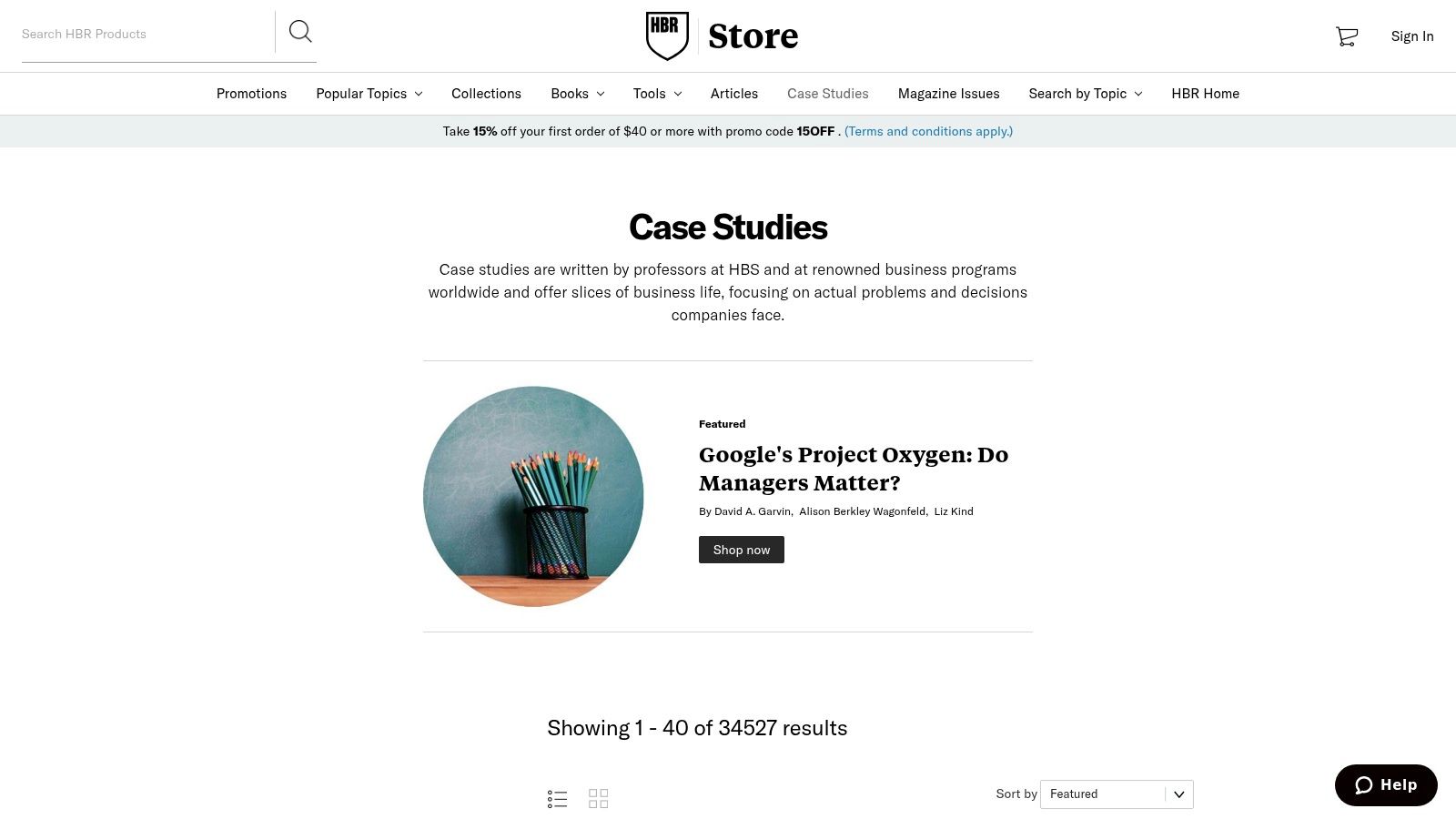
The platform allows users to bypass institutional subscriptions and purchase individual cases directly, making it accessible for independent research. The search and filter functions are robust, enabling you to find cases by industry, company, or specific business concepts like “lean startup” or “product validation.”
Strategic Analysis & Key Offerings
The true value of the HBR Store lies in its depth. Each case study presents a real-world business problem and walks you through the decision-making process, often including proprietary data and internal discussions. This structured format forces you to analyze the situation from a founder’s perspective, making it a powerful tool for strategic planning.
- Core Offering: In-depth, classroom-tested business case studies on MVP development, validation, and pivoting.
- Unique Feature: Many cases come with accompanying “Teaching Notes,” which reveal the key learning objectives and intended analytical takeaways. This provides a “behind-the-scenes” guide to what makes the case study strategically important.
- User Experience: The website is straightforward. You can search, preview abstracts, and purchase cases for instant download as PDFs. The interface is academic and functional rather than flashy.
Pricing & Access
The HBR Store operates on a pay-per-case model. This is a significant advantage for those needing targeted information without committing to a full subscription.
| Feature | Details |
|---|---|
| Pricing Model | Per-case purchase (typically $8.95 – $14.95 per case study) |
| Access Format | Instant PDF download |
| License Terms | Primarily for individual use; licenses restrict distribution. |
| Pros | Authoritative content, accessible without subscriptions. |
| Cons | Costs can accumulate, and licenses are restrictive for teams. |
This platform is an essential resource for anyone wanting to move beyond surface-level articles and engage with the granular, data-backed stories behind successful and failed MVPs.
Website: https://store.hbr.org/case-studies/
2. The Case Centre
For a more comprehensive, global perspective on minimum viable product examples, The Case Centre acts as a vast aggregator, bringing together case studies from the world’s leading business schools. It serves as a one-stop shop where founders can access over 70,000 cases from institutions like Darden, Ivey, and INSEAD, providing a much broader selection than any single publisher’s store. This diversity allows for a comparative analysis of MVP strategies across different industries and geographical markets.
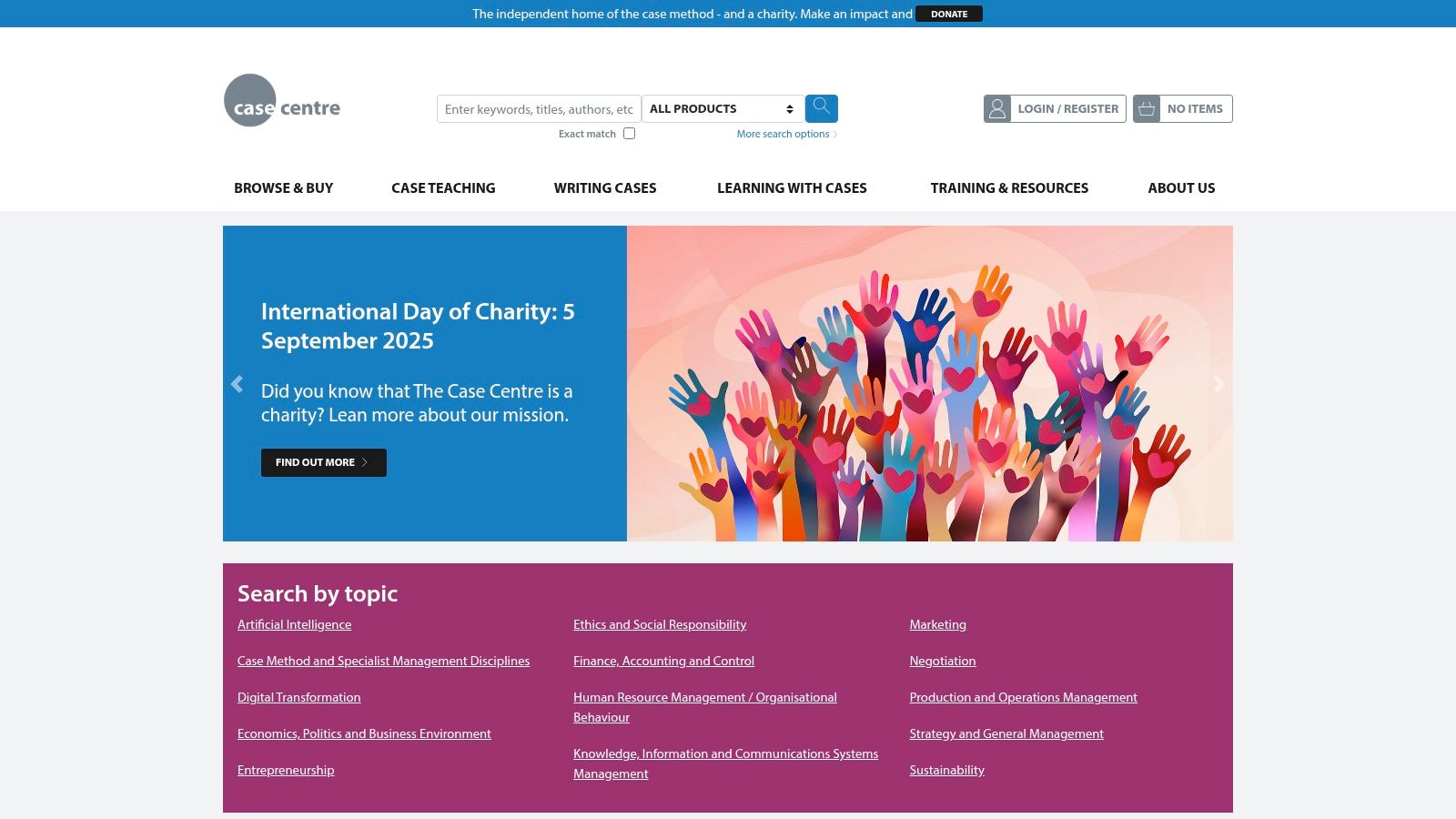
The platform’s strength is its centralized search and discovery engine. Instead of visiting multiple university websites, you can use topical filters for concepts like “lean testing,” “market validation,” or “bootstrapping” to find relevant case studies from a multitude of expert sources. This makes it an efficient tool for researching specific MVP challenges or learning how different companies approached similar problems.
Strategic Analysis & Key Offerings
The Case Centre’s value proposition is breadth and competitive access. By consolidating materials from various publishers, it exposes users to different analytical frameworks and storytelling styles, offering a richer, more varied learning experience. You might find a case on a Silicon Valley tech MVP alongside one detailing a lean launch for a social enterprise in Southeast Asia.
- Core Offering: A massive, searchable database of management case studies focused on entrepreneurship, innovation, and product strategy from dozens of top-tier institutions.
- Unique Feature: Curated “bestseller” and “award-winning” case lists help surface the most impactful and widely-taught minimum viable product examples, guiding users to proven educational content.
- User Experience: The interface is functional and geared toward academic research. Its powerful search and filtering capabilities are the main highlight, enabling precise discovery across the extensive catalog.
Pricing & Access
The Case Centre simplifies purchasing by offering a centralized payment system for cases from many different suppliers, often at competitive prices. Access is typically instant, making it ideal for on-demand research needs.
| Feature | Details |
|---|---|
| Pricing Model | Per-case purchase (prices vary by publisher but are clearly listed) |
| Access Format | Instant PDF download for most items |
| License Terms | Primarily for individual study; distribution is typically restricted. |
| Pros | Unmatched selection from global sources, competitive pricing. |
| Cons | Teaching notes and instructor materials are restricted to educators. |
This platform is the ideal resource for anyone wanting to cast a wide net and explore MVP strategies from a diverse set of academic and business perspectives, all in one place.
Website: https://www.thecasecentre.org/
3. Strategyzer (official site)
For founders who want to build the strategic frameworks behind their MVP, Strategyzer offers a masterclass in the foundational tools. Rather than just showcasing minimum viable product examples, the platform teaches the methodologies that create them, such as the Business Model Canvas and Value Proposition Canvas. It’s an educational resource designed to help you de-risk your ideas before you even write a line of code.
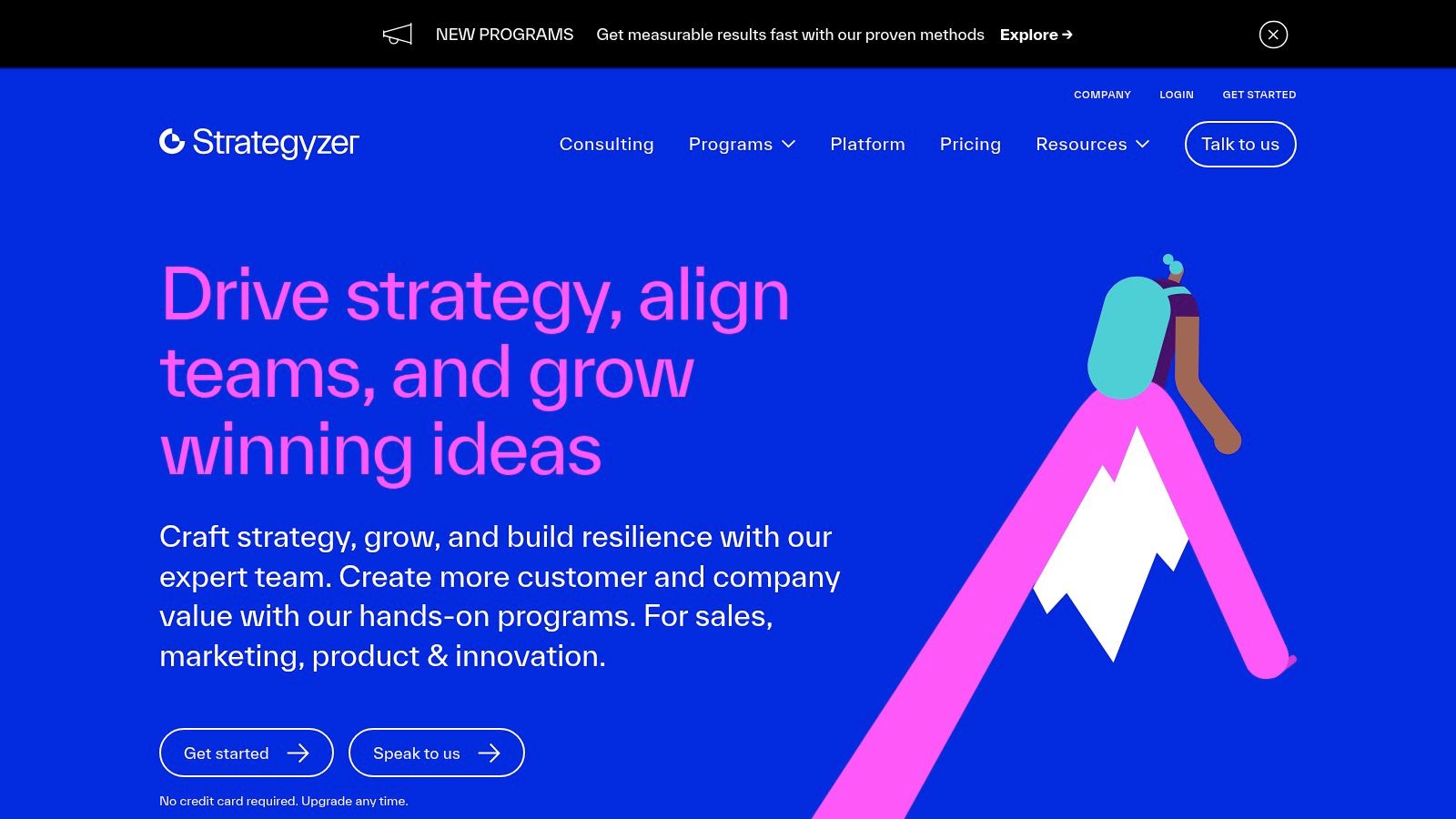
The platform provides a suite of online courses, software tools, and downloadable templates that guide entrepreneurs through the process of mapping customer needs, defining value, and designing business experiments. This structured, visual approach makes complex business strategy accessible and directly applicable to the MVP planning process.
Strategic Analysis & Key Offerings
Strategyzer’s value lies in its direct link between theory and practice. The canvases it popularizes are not just academic exercises; they are practical tools for articulating hypotheses about your business model that can then be tested with an MVP. This systemizes the ideation and validation phases.
- Core Offering: Structured courses and programs on the Business Model Canvas, Value Proposition Design, and business experiment testing.
- Unique Feature: An integrated software suite that allows teams to collaborate on canvases, track experiments, and manage their innovation pipeline digitally. This moves the concepts from a whiteboard into a dynamic project management tool.
- User Experience: The site is clean, professional, and easy to navigate. Courses are delivered through a modern learning management system with high-quality video lectures, quizzes, and practical assignments.
Pricing & Access
Strategyzer offers a tiered pricing model that caters to individuals, teams, and large enterprises, making its powerful tools accessible at different scales.
| Feature | Details |
|---|---|
| Pricing Model | Tiered subscriptions (Individual, Team, Enterprise) and per-course purchases. |
| Access Format | On-demand video courses, web-based software, downloadable PDFs. |
| License Terms | Based on the number of users (seats) for team and enterprise plans. |
| Pros | Practical, visual methodology; reputable and proven frameworks. |
| Cons | Courses can be a significant investment; team plans require sales contact. |
This platform is ideal for teams that need to build a shared language and a rigorous process for validating business ideas before committing significant resources to development.
Website: https://www.strategyzer.com/
4. LEANSTACK / LEANFoundry (Ash Maurya)
For founders who need a practical, hands-on toolkit for building their minimum viable product examples, LEANSTACK provides a comprehensive suite of resources created by Ash Maurya, author of “Running Lean.” This platform moves beyond theory, offering browser-based tools and structured playbooks designed to guide entrepreneurs through every stage of the validation process, from initial idea to scalable business model.
Unlike platforms focused on case studies, LEANSTACK is an active workspace. It equips users with the digital equivalent of a startup whiteboard, featuring tools like the Lean Canvas, Traction Roadmap, and Customer Forces canvas. This focus on actionable frameworks makes it an invaluable resource for founders who prefer doing and testing over passive reading.
Strategic Analysis & Key Offerings
The core value of LEANSTACK lies in its structured, experiment-driven methodology. It translates the principles of the Lean Startup into a clear, step-by-step process. Instead of just learning about MVPs, users are actively building and validating their own through a series of guided “sprints” and validation experiments.
- Core Offering: A suite of integrated digital canvases (Lean Canvas, Validation Plan, etc.) and step-by-step playbooks for continuous innovation.
- Unique Feature: Access to coaching clinics and a community led by Ash Maurya and other experts, providing direct feedback and guidance on your specific business challenges.
- User Experience: The platform is designed for action. The tools are intuitive and built for collaboration, allowing teams to work on canvases and track experiments in a shared, cloud-based environment.
Pricing & Access
LEANSTACK’s model is geared toward serious founders and teams committed to implementing lean principles, with pricing that reflects its comprehensive, program-based nature.
| Feature | Details |
|---|---|
| Pricing Model | Annual subscription model (often around $999/year for team access) |
| Access Format | Web-based platform access to tools, playbooks, and community. |
| License Terms | Varies by plan, with team-focused bundles allowing for multiple collaborators. |
| Pros | Actionable, experiment-oriented approach; team collaboration features. |
| Cons | Higher cost may be a barrier for solo founders; best value requires ecosystem commitment. |
This platform is ideal for founders who want a guided, repeatable system for de-risking their startup idea and turning hypotheses into validated business models.
Website: https://leanstack.com/
5. Udemy (MVP courses catalog)
For entrepreneurs and product teams who prefer a hands-on, instructional approach to learning, Udemy’s vast catalog of courses offers a practical alternative to academic case studies. Instead of just reading about minimum viable product examples, this platform provides structured video lessons, downloadable resources, and project-based assignments that teach you how to build, launch, and validate an MVP from the ground up.
The platform’s strength is its accessibility and variety, with dozens of courses covering everything from lean startup theory and customer validation techniques to no-code MVP development. Community-driven ratings and detailed reviews help you filter for high-quality content, ensuring you find an instructor and curriculum that match your specific learning style and technical needs.
Strategic Analysis & Key Offerings
Udemy’s value lies in its actionable, skill-building format. While HBR provides strategic analysis, Udemy focuses on the “how-to,” equipping founders with the tactical skills needed to execute an MVP strategy. Courses often include real-world examples as part of the curriculum, breaking them down step-by-step to illustrate key principles.
- Core Offering: Self-paced video courses on MVP ideation, building (including no-code), and launching.
- Unique Feature: The sheer diversity of content means you can find niche courses on topics like “Building an MVP with Bubble” or “Validating ideas with landing page tests,” allowing for highly targeted skill development.
- User Experience: The interface is user-friendly and optimized for learning, with lifetime access to purchased courses. Frequent sales and promotions make it a highly affordable resource for continuous learning.
Pricing & Access
Udemy uses a pay-per-course model, often with significant discounts that make its content extremely accessible. This allows for targeted learning without the commitment of a monthly subscription.
| Feature | Details |
|---|---|
| Pricing Model | Per-course purchase (often heavily discounted to $10 – $20 during sales) |
| Access Format | Lifetime on-demand video access across web and mobile devices. |
| License Terms | For individual learning; not transferable. |
| Pros | Low-cost entry, wide variety of topics and teaching styles, lifetime access. |
| Cons | Course quality can be inconsistent; requires checking reviews carefully. |
This platform is ideal for those who learn by doing and want to acquire the practical skills necessary to turn an idea into a testable product, often using the same tools and techniques highlighted in the courses themselves.
Website: https://www.udemy.com/topic/minimum-viable-product/
6. Product Hunt
For founders seeking a real-time, unfiltered firehose of minimum viable product examples, Product Hunt is an indispensable daily resource. Unlike static case studies, it’s a live discovery platform where new products and MVPs launch every day. This provides a dynamic, constantly updated library of launch strategies, landing page designs, and initial feature sets from thousands of early-stage companies.
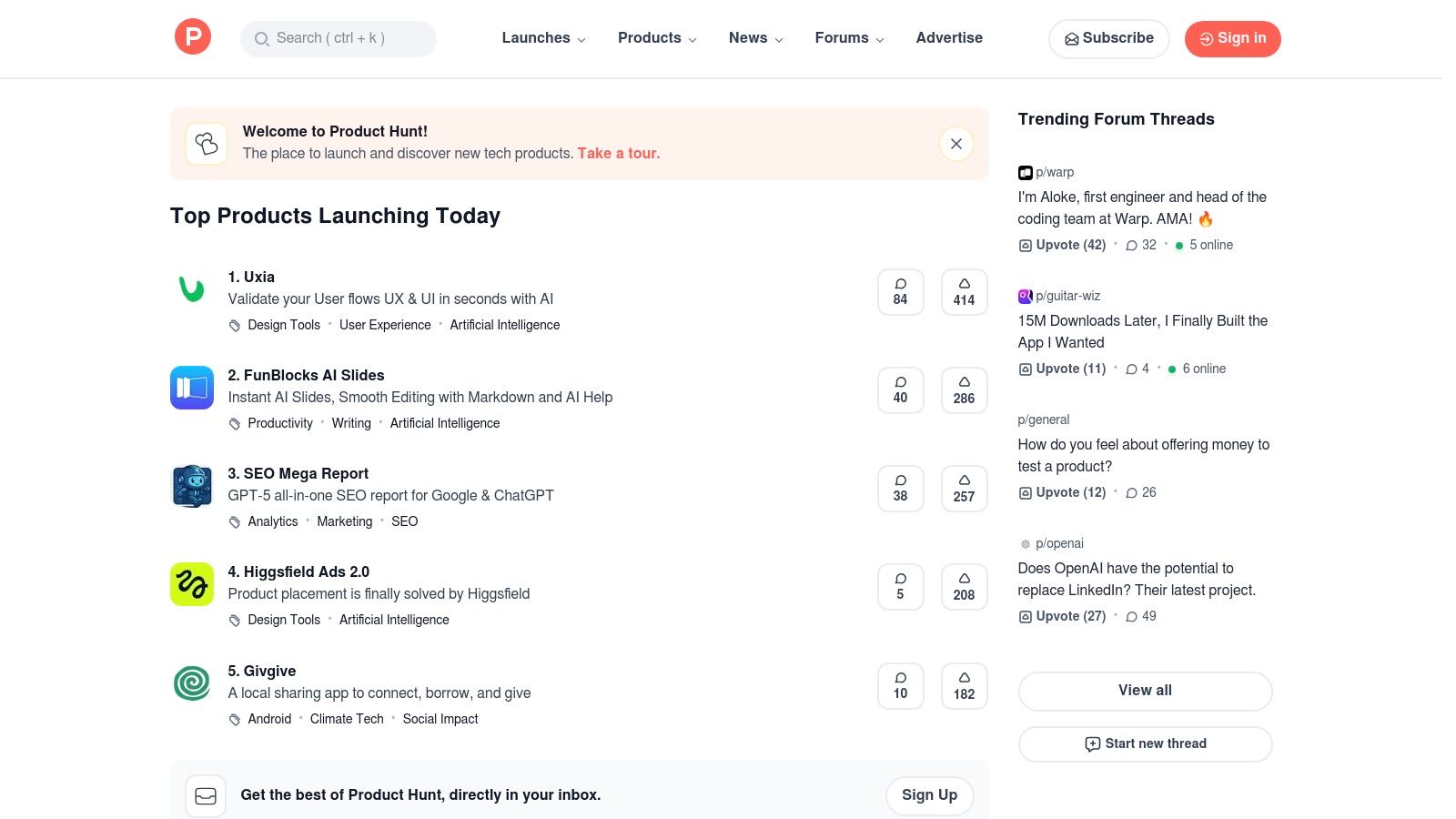
The platform’s core value is its community-driven curation. Users upvote new launches, pushing the most interesting MVPs to the top. This allows you to see what’s currently resonating with an early-adopter audience, analyze product positioning in real-time, and study how founders engage with their first users in the comments.
Strategic Analysis & Key Offerings
Product Hunt serves as a living laboratory for market validation. By observing daily launches, you can identify emerging trends, assess competitive pitches, and dissect which value propositions gain immediate traction. The direct interaction between makers and users in the discussion threads offers priceless, raw feedback on product-market fit.
- Core Offering: A daily feed of new product launches, providing a massive, searchable database of real-world MVPs.
- Unique Feature: The community Q&A on each product page is a goldmine. Founders often share their MVP development process, tech stack, and early validation learnings directly in the comments.
- User Experience: The interface is clean and gamified, encouraging discovery. Users can easily browse, upvote, comment, and save products to collections for later analysis.
Pricing & Access
Product Hunt is fundamentally a free community platform, making it one of the most accessible resources for MVP research and inspiration.
| Feature | Details |
|---|---|
| Pricing Model | Free to browse, join discussions, and submit products. |
| Access Format | Web-based platform and mobile app. |
| License Terms | Content is publicly accessible; no restrictions on browsing. |
| Pros | Free, vast source of contemporary MVPs and launch strategies. |
| Cons | Signal-to-noise ratio can be high; not all launches gain traction or survive. |
This platform is perfect for founders and product managers who want to stay on the pulse of innovation, learn from the successes and failures of their peers, and find inspiration for their own launch.
Website: https://www.producthunt.com/
7. Amazon (Books: Lean Startup, Running Lean, Testing Business Ideas)
For founders building their foundational knowledge, Amazon serves as the most accessible library of minimum viable product examples and methodologies. Instead of single case studies, it offers comprehensive books like “The Lean Startup” by Eric Ries, “Running Lean” by Ash Maurya, and “Testing Business Ideas” by David J. Bland and Alexander Osterwalder. These texts compile dozens of case studies and provide step-by-step frameworks for validation.
The platform’s major advantage is immediate access. With options for Kindle, audiobook, or fast paperback delivery, entrepreneurs can start learning and applying these proven MVP principles in a matter of hours. The customer reviews and “Look Inside” previews allow for quick evaluation before purchase, ensuring the content aligns with a team’s specific needs.
Strategic Analysis & Key Offerings
Amazon’s value is in providing the strategic blueprints behind the MVP concept itself. These books are not just stories; they are operational manuals that teach you how to think about product validation, customer discovery, and iterative development. They provide the “why” behind the lean movement, backed by real-world successes and failures.
- Core Offering: Foundational books that consolidate numerous MVP case studies, frameworks, and actionable checklists into a single resource.
- Unique Feature: The sheer breadth of related content. After reading a core text, Amazon’s recommendation engine suggests supplementary materials on related topics like customer interviewing, agile development, or growth hacking.
- User Experience: The familiar Amazon interface makes discovery and purchase frictionless. Multiple formats (Kindle, Audible, physical) cater to different learning styles, from reading on a commute to listening during a workout.
Pricing & Access
Amazon makes this essential knowledge highly affordable and universally accessible, removing the cost barrier that often accompanies specialized business training.
| Feature | Details |
|---|---|
| Pricing Model | Per-book purchase (popular titles often under $25) |
| Access Format | Kindle, paperback, hardcover, and audiobook formats available |
| License Terms | Standard personal use; Kindle versions can be shared via Family Library. |
| Pros | Affordable, evergreen examples, and a vast selection of related lean method content. |
| Cons | Requires self-discipline to translate frameworks into your specific business context. |
This platform is the ideal starting point for anyone seeking to build a deep, strategic understanding of the lean startup methodology before launching their own MVP.
Website: https://www.amazon.com/
7 MVP Example Platforms Comparison
| Resource | Implementation Complexity 🔄 | Resource Requirements ⚡ | Expected Outcomes 📊 | Ideal Use Cases 💡 | Key Advantages ⭐ |
|---|---|---|---|---|---|
| Harvard Business Review Store (Harvard Business Publishing) | Medium – requires reading and interpreting case studies | Purchase cost per case; no institutional access needed | Deep understanding of MVP successes/failures in real cases | MBA students, educators, focused case study learners | Authoritative, classroom-tested, structured teaching notes |
| The Case Centre | Medium – managing multiple cases and publishers | Competitive pricing but multiple purchases likely | Broad insight across industries and geographies | Researchers, educators, and learners seeking variety in cases | Extensive global catalog, curated bestseller lists |
| Strategyzer (official site) | Medium-High – structured courses and software tools | Paid subscription/courses; requires time investment | Practical MVP design skills with certification | Teams and individuals wanting hands-on visual business modeling | Visual tools, recognized methodology, certification |
| LEANSTACK / LEANFoundry (Ash Maurya) | Medium-High – interactive tools and guided workshops | Annual subscription ($999/year); community access | Actionable MVP validation and continuous innovation | Founders and startups needing hands-on MVP planning | Step-by-step playbooks, founder-focused, collaborative tools |
| Udemy (MVP courses catalog) | Low-Medium – self-paced video courses | Low cost with frequent discounts | Quick MVP skill acquisition | Self-learners requiring affordable, flexible MVP education | Affordable, wide variety, immediate access |
| Product Hunt | Low – browsing, community engagement | Free; internet access | Exposure to live MVP launches and community insights | Entrepreneurs seeking current MVP examples and launch feedback | Free, real-time, community-driven, diverse MVP showcase |
| Amazon (Books: Lean Startup, Running Lean, Testing Business Ideas) | Low – requires reading and applying frameworks | Low cost books + shipping; self-driven learning | Foundational MVP and lean knowledge | Individuals preferring traditional learning and reference | Affordable, multiple formats, comprehensive MVP frameworks |
Putting MVP Theory into Practice: Your Next Steps
The diverse set of minimum viable product examples and resources we’ve explored, from the curated case studies at The Case Centre to the real-time launches on Product Hunt, all point to a single, powerful conclusion. Building a successful product is not about achieving perfection on day one; it’s about initiating a conversation with your market as efficiently as possible. The goal is to learn, not just to launch.
Each example, whether a high-level strategic framework from Strategyzer or a practical course on Udemy, underscores the importance of focusing on the core value proposition. Success hinges on your ability to identify the most critical user problem and solve it with the absolute minimum set of features required. This approach minimizes wasted resources, reduces risk, and accelerates the feedback loop that is vital for genuine product-market fit.
Key Takeaways for Your MVP Strategy
To distill the lessons from these examples into a practical framework, consider these core principles:
- Prioritize Learning Over Features: Your primary goal is to validate your riskiest assumption. Every feature should be a tool to test a hypothesis about your customer’s needs and behaviors.
- Define “Viable” Tightly: “Viable” does not mean feature-rich. It means the product must reliably solve the core problem for your initial target audience, providing just enough value to be adopted and generate feedback.
- Measure What Matters: Before you write a single line of code, define your key metrics for success. Whether it’s user engagement, conversion rates, or direct feedback, know how you will measure the outcome of your experiment.
Choosing Your Tools and Path Forward
The resources mentioned, like the seminal books The Lean Startup and Running Lean, provide the theoretical foundation. Tools like Product Hunt offer a platform for launch and initial feedback. However, translating this theory into a functional product requires a clear plan and the right execution partner.
Your next steps should involve a candid assessment of your internal capabilities. Do you have the technical expertise to build, launch, and iterate quickly? Can you afford the time and cost of a learning curve? For those looking to transition from theory to execution, exploring dedicated MVP development services can be a valuable next step, providing the expertise to build a robust and scalable foundation without the typical overhead.
Ultimately, the journey from an idea to a thriving business is a series of calculated experiments. By embracing the MVP mindset, you empower yourself to navigate this path with agility and intelligence, building a product that your customers not only need but will champion.
Ready to turn your vision into a reality? At KP Infotech, we specialize in transforming innovative ideas into functional, market-ready MVPs. We act as your dedicated development partner, helping you navigate the technical challenges of building and launching a scalable digital product.
